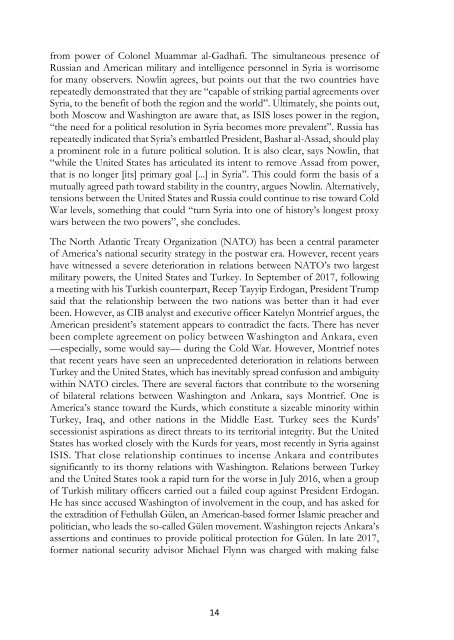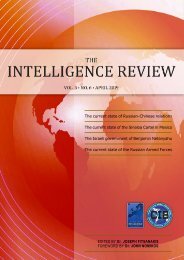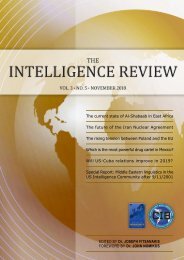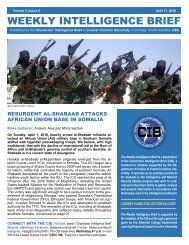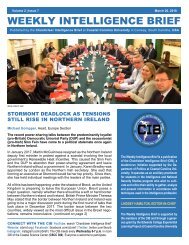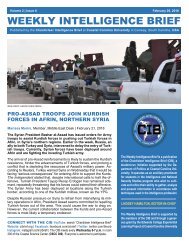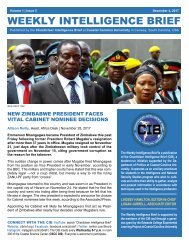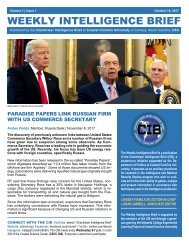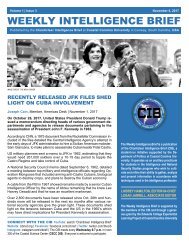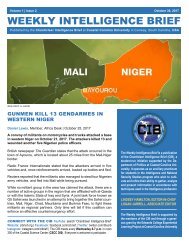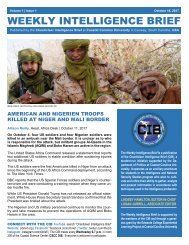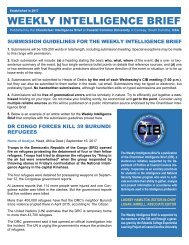The Intelligence Review | volume 2 | issue 4 |
This volume is the product of a collaboration between the European Intelligence Academy (EIA) and the Chanticleer Intelligence Brief (CIB), a student-run initiative supported by the Department of Politics at Coastal Carolina University in Conway, South Carolina, United States. Four CIB analysts tackle some of the most pressing and timely questions confronting intelligence observers today. Topics in this volume include the possibility of a war with North Korea, and the rise of far-right militancy in the United States. The volume also includes an assessment of the impact of the Islamic State in the relations between Russia and the United States, and a discussion of Turkish politics and its effect on NATO's cohesion.
This volume is the product of a collaboration between the European Intelligence Academy (EIA) and the Chanticleer Intelligence Brief (CIB), a student-run initiative supported by the Department of Politics at Coastal Carolina University in Conway, South Carolina, United States. Four CIB analysts tackle some of the most pressing and timely questions confronting intelligence observers today. Topics in this volume include the possibility of a war with North Korea, and the rise of far-right militancy in the United States. The volume also includes an assessment of the impact of the Islamic State in the relations between Russia and the United States, and a discussion of Turkish politics and its effect on NATO's cohesion.
You also want an ePaper? Increase the reach of your titles
YUMPU automatically turns print PDFs into web optimized ePapers that Google loves.
from power of Colonel Muammar al-Gadhafi. <strong>The</strong> simultaneous presence of<br />
Russian and American military and intelligence personnel in Syria is worrisome<br />
for many observers. Nowlin agrees, but points out that the two countries have<br />
repeatedly demonstrated that they are “capable of striking partial agreements over<br />
Syria, to the benefit of both the region and the world”. Ultimately, she points out,<br />
both Moscow and Washington are aware that, as ISIS loses power in the region,<br />
“the need for a political resolution in Syria becomes more prevalent”. Russia has<br />
repeatedly indicated that Syria’s embattled President, Bashar al-Assad, should play<br />
a prominent role in a future political solution. It is also clear, says Nowlin, that<br />
“while the United States has articulated its intent to remove Assad from power,<br />
that is no longer [its] primary goal [...] in Syria”. This could form the basis of a<br />
mutually agreed path toward stability in the country, argues Nowlin. Alternatively,<br />
tensions between the United States and Russia could continue to rise toward Cold<br />
War levels, something that could “turn Syria into one of history’s longest proxy<br />
wars between the two powers”, she concludes.<br />
<strong>The</strong> North Atlantic Treaty Organization (NATO) has been a central parameter<br />
of America’s national security strategy in the postwar era. However, recent years<br />
have witnessed a severe deterioration in relations between NATO’s two largest<br />
military powers, the United States and Turkey. In September of 2017, following<br />
a meeting with his Turkish counterpart, Recep Tayyip Erdogan, President Trump<br />
said that the relationship between the two nations was better than it had ever<br />
been. However, as CIB analyst and executive officer Katelyn Montrief argues, the<br />
American president’s statement appears to contradict the facts. <strong>The</strong>re has never<br />
been complete agreement on policy between Washington and Ankara, even<br />
—especially, some would say— during the Cold War. However, Montrief notes<br />
that recent years have seen an unprecedented deterioration in relations between<br />
Turkey and the United States, which has inevitably spread confusion and ambiguity<br />
within NATO circles. <strong>The</strong>re are several factors that contribute to the worsening<br />
of bilateral relations between Washington and Ankara, says Montrief. One is<br />
America’s stance toward the Kurds, which constitute a sizeable minority within<br />
Turkey, Iraq, and other nations in the Middle East. Turkey sees the Kurds’<br />
secessionist aspirations as direct threats to its territorial integrity. But the United<br />
States has worked closely with the Kurds for years, most recently in Syria against<br />
ISIS. That close relationship continues to incense Ankara and contributes<br />
significantly to its thorny relations with Washington. Relations between Turkey<br />
and the United States took a rapid turn for the worse in July 2016, when a group<br />
of Turkish military officers carried out a failed coup against President Erdogan.<br />
He has since accused Washington of involvement in the coup, and has asked for<br />
the extradition of Fethullah Gülen, an American-based former Islamic preacher and<br />
politician, who leads the so-called Gülen movement. Washington rejects Ankara’s<br />
assertions and continues to provide political protection for Gülen. In late 2017,<br />
former national security advisor Michael Flynn was charged with making false<br />
14


